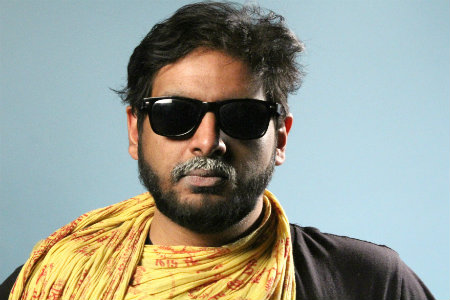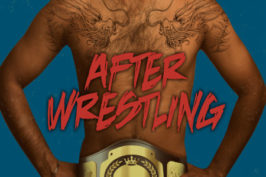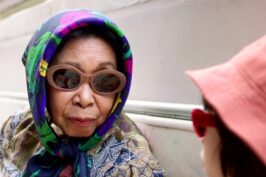Written & Performed by Jivesh Parasram, Take d Milk, Nah? is the story of how he once birthed a cow… kinda. Catchy tag line, no? Read on to find out about the inspiration behind Parasram’s show.
HM: I read you first performed Take d Milk, Nah? as a story in Pressgang Theatre’s “Milestones” storytelling event in 2015, and it was also presented at CAMINOS 2017. How did it evolve over time into the format we’ll see on-stage at Theatre Passe Muraille?
Jivesh Parasram (JP): Quite a bit! The first incarnation was as a one-off story for an evening Pressgang had put together on “Milestones” – so for me that was this time I birthed a cow – sort of. Beyond a pretty standard western storytelling style, it had some elements of Hindu storytelling for context. That was about 12-15 minutes. After that, I expanded it slightly for bcurrent‘s RPS festival and made it a bit more theatrical – adding in some sound elements and a performative ritual aspect. That one was closer to 25 minutes or so, and it brought in more of my family history touching on the Indian Indentureship in Trinidad. That got picked up for a showing in Surrey, BC as part of the inaugural Monsoon Festival, and so it went up to about 30 minutes.
The one we did at CAMINOS this fall actually brought the time back to about 20-25 minutes, so it refined a bit of the storytelling working with Graham and Tom* a bit more involved around what was necessary. As for what we’re looking at for this production with Pandemic & bcurrent with the support of TPM – it’s pretty different! We’ve maintained most of the content from CAMINOS, but the piece then takes a radical shift and breaks open into a more fragmented form. It’s also framed differently – so the whole thing is now a full length one act “play.”
*Graham Isador, Dramaturg and Tom Arthur Davis, Director for this production of Take d Milk, Nah?
HM: Given this is a personal piece, how do you decide what elements or themes will be part of the performance? I’d assume it is somewhat difficult to decide.
JP: It’s so difficult! This is where I lean heavily on Tom and Graham, who I’ve co-created the piece with for support. I have a tendency to overwrite – like I’ll churn out pages and pages of material then we cut it back and shape it. Usually that’s easy because I’m not very precious about my own writing. But with this one, I’m balancing a lot of material that’s from my personal experience and also representing some otherwise underrepresented history. So all of a sudden, I started getting very defensive. So I really needed my collaborators to help me focus on the purpose.
The reason for the defensiveness, I think, is that a lot of what I was writing about is material where I’d constantly be discovering new things that I never even knew about my family, about colonial history, or about hinduism in the Caribbean. Or at least didn’t consider in the same way. I’d come into rehearsal and be like “I just found this out! I wrote 10 pages on it! Isn’t that amazing?” Cause to me it was! But then they’d point out that there was like one sentence that could communicate my 10 page ramble. Or they could identify that while it was super cool…. not really relevant to what we’re working on at the moment. Ultimately we got to a place where we had all the material, we could see what was working, and then could make cuts based on what we felt the real story we wanted to tell was.

Founders of Pandemic Theatre
HM: In the show’s synopsis, it reads that you’ll take the audience through the Hin-do’s and Hin-don’ts when it comes to the cultures that are part of who you are. Without giving much away, can you give us an example of each a Hin-do and Hin-don’t?
JP: Ha! Sure! Practically it’s a bit of a joke, because Hinduism doesn’t really have any rules per se. There’s guidelines…and a ton of conflicting philosophy and stories – but there’s not set of commandments or anything. So the easiest one – Cows are awesome, being nice to cows: Hin-do. Punching a cow in the face: Hin-don’t. But of course it gets a bit more complicated the more you start to think through them, particularly because there’s no handbook so to speak.
HM: Since other audiences have seen other ‘incarnations’ of the show, can you share some of their post-show reactions?
JP: So far it’s been pretty positive. People tend to really get into the casual style of the show, and resonate with the comedy of trying to hold onto an identity that you’re not part of. On the other hand, when I did it in Surrey, BC – I was terrified of how it would be received. Surrey has a huge South Asian population. And the Monsoon Festival was focussed on South Asian work. As an Indo-Caribbean we’re not always seen to be of the same culture by folks who are from South Asia proper. We’re like a diaspora that is then further experiencing diaspora by being in Canada. So when I walked out and the front row was all these “Aunties and Uncles” I really didn’t know how they’d receive it. But they were into it. And talking to some of them after, they really appreciated hearing some of their traditional stories told in a different way.
HM: In this show, you hope to get us to think about “what divides us – and what we’re willing to accept in the desire to belong”… what do you hope Toronto audiences take home after experiencing Take d Milk, Nah?
JP: I think the political moment we’re in right now, in this city, and on a broader cultural standpoint is one where people are genuinely curious about how to be better on the one hand – and also how to absolutely not change and maintain the status quo on the other hand. It’s quite polarizing. And so I see people forced into identifying with one group or the other. And a lot of nuance gets lost there – on both sides. For me, I’d want Toronto audiences to go away maybe thinking more critically about what it means to identify as “one or the other” and with that, how much they may be not so cleanly on either side. Also that they have a good time along the way – it’s a pretty comedic show, so we can think about hard stuff while laughing.
I, for one, am definitely looking forward to being part of the experience. It is also great to see many of our cultures being represented on-stage here in Toronto. We’re living in exciting times.
Take d Milk, Nah? runs from April 10-22, 2018 at Theatre Passe Muraille’s Backspace. General admission tickets are $20, HST included. For scheduling information and advance tickets, please visit passemuraille.ca.
*Photos by Marko Kovacevic








3 comments
Comments are closed.